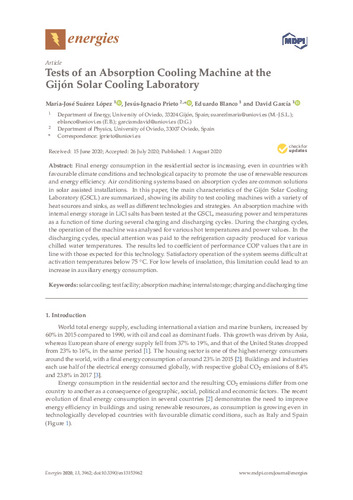Tests of an Absorption Cooling Machine at the Gijon Solar Cooling Laboratory
Autor(es) y otros:
Palabra(s) clave:
solar cooling
test facility
Fecha de publicación:
Versión del editor:
Citación:
Descripción física:
Resumen:
Final energy consumption in the residential sector is increasing, even in countries withfavourable climate conditions and technological capacity to promote the use of renewable resourcesand energy efficiency. Air conditioning systems based on absorption cycles are common solutionsin solar assisted installations. In this paper, the main characteristics of the Gijón Solar CoolingLaboratory (GSCL) are summarized, showing its ability to test cooling machines with a variety ofheat sources and sinks, as well as different technologies and strategies. An absorption machine withinternal energy storage in LiCl salts has been tested at the GSCL, measuring power and temperaturesas a function of time during several charging and discharging cycles. During the charging cycles,the operation of the machine was analysed for various hot temperatures and power values. In thedischarging cycles, special attention was paid to the refrigeration capacity produced for variouschilled water temperatures. The results led to coefficient of performance COP values that are inline with those expected for this technology. Satisfactory operation of the system seems difficult atactivation temperatures below 75◦C. For low levels of insolation, this limitation could lead to anincrease in auxiliary energy consumption.
Final energy consumption in the residential sector is increasing, even in countries withfavourable climate conditions and technological capacity to promote the use of renewable resourcesand energy efficiency. Air conditioning systems based on absorption cycles are common solutionsin solar assisted installations. In this paper, the main characteristics of the Gijón Solar CoolingLaboratory (GSCL) are summarized, showing its ability to test cooling machines with a variety ofheat sources and sinks, as well as different technologies and strategies. An absorption machine withinternal energy storage in LiCl salts has been tested at the GSCL, measuring power and temperaturesas a function of time during several charging and discharging cycles. During the charging cycles,the operation of the machine was analysed for various hot temperatures and power values. In thedischarging cycles, special attention was paid to the refrigeration capacity produced for variouschilled water temperatures. The results led to coefficient of performance COP values that are inline with those expected for this technology. Satisfactory operation of the system seems difficult atactivation temperatures below 75◦C. For low levels of insolation, this limitation could lead to anincrease in auxiliary energy consumption.
ISSN:
DOI:
Patrocinado por:
This research was funded by the National Research and Development Plan 2004–2007 (Ref. PS-120000-2005-1),co-financed by ERDF funds and supported by the Spanish Ministry of Innovation and Science.
Colecciones
- Artículos [35233]
- Energía [228]
- Investigaciones y Documentos OpenAIRE [7668]
Ficheros en el ítem





